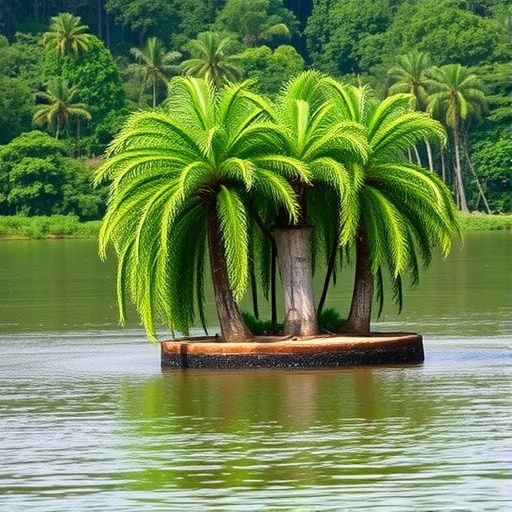The Hidden Treasures of the Amazon: River Islands as Biodiversity Hotspots and Carbon Reservoirs
The Amazon rainforest, often referred to as the lungs of the Earth, continues to reveal its enigmatic nature through diverse ecosystems that flourish in its depths. Among these ecosystems are the lesser-known river islands, unique habitats that host an exceptional variety of flora and fauna. Recent research conducted by Tiruneh et al. highlights the ecological importance of these islands, emphasizing their role as biodiversity hotspots, carbon reservoirs, and critical ecological corridors that require urgent conservation efforts.
River islands in the Amazon are surprisingly rich in biodiversity, serving as vital refuges for numerous species. Due to the dynamic nature of river systems, these islands create isolated environments where unique evolutionary processes can take place. Many species that inhabit these islands are not found anywhere else on the planet, making them crucial for conservation. By studying these isolated ecosystems, researchers can gain insights into evolutionary biology, species adaptation, and the impact of climate change on biodiversity.
These islands play a pivotal role in carbon sequestration, acting as significant carbon reservoirs within the broader Amazon ecosystem. Vegetation on these islands absorbs carbon dioxide from the atmosphere, storing carbon in both plant biomass and soil. This characteristic adds another layer of importance to their preservation amid increasing concerns about climate change and its impact on global warming. Protecting these natural carbon sinks is essential not just for the Amazon region but for global efforts to mitigate climate change.
Moreover, river islands serve as ecological corridors that facilitate species movement and gene flow across fragmented landscapes in the Amazon. As deforestation and habitat destruction continue to threaten the Amazon’s biodiversity, these corridors can help maintain genetic diversity by allowing species to migrate as environmental conditions change. Ensuring that these islands remain connected is vital for the survival of many species, especially as they face the pressures of climate change and habitat loss.
The study by Tiruneh et al. also highlights the cultural significance of river islands. Many indigenous communities rely on these lands for their livelihoods, utilizing the diverse resources that these ecosystems provide. Conservation efforts must, therefore, include the perspectives and knowledge of local communities who have lived in harmony with the Amazon for generations. Integrating indigenous knowledge and modern conservation techniques can create effective strategies for preserving these sensitive ecosystems.
Furthermore, river islands currently face numerous threats, including deforestation, pollution, and climate change. The encroachment of agriculture and urban development poses significant risks, disrupting the delicate balance of these ecosystems. Addressing these issues requires a multi-faceted approach that combines scientific research, policy change, and community involvement. By developing sustainable practices and promoting awareness, stakeholders can work together to safeguard these vital spaces.
International cooperation will be essential to protect the Amazon’s river islands. Countries situated along the Amazon basin must collaborate to establish cross-border conservation initiatives. This collective effort can enhance ecological resilience and aid in the effective management of shared resources. By working together, neighboring nations can share data, research findings, and successful conservation strategies, providing a comprehensive approach to preserving these ecosystems.
The findings from this research underscore a critical need for integrated conservation strategies that recognize the interconnectedness of species, habitats, and human activities. Effective conservation must not only focus on protecting these islands but also consider the larger ecological context in which they exist. Strategies should aim to restore habitats, reduce pollution, and mitigate the impacts of climate change through holistic management practices.
Public awareness and education are crucial components of conservation efforts. As global citizens become increasingly aware of environmental issues, there is a growing demand for action. By engaging communities, schools, and the media in conservation dialogues, we can foster a culture of environmental stewardship. Knowledge-sharing platforms can empower individuals to contribute to conservation initiatives, making them active participants in protecting the Amazon.
Encouraging ecotourism can also serve as a means to promote conservation of river islands in the Amazon. By showcasing the islands’ unique biodiversity and cultural heritage, responsible tourism can create economic incentives for local communities to engage in sustainable practices. This approach not only supports local economies but also raises awareness about the importance of preserving these habitats and their biodiversity.
In conclusion, the Amazon’s river islands are crucial components of a complex ecosystem that must be protected and preserved. With their rich biodiversity, capacity to sequester carbon, and role as ecological corridors, these islands hold immense significance for the planet. It is imperative that we act decisively to safeguard these treasures before they are irreversibly damaged. By uniting scientific research, community action, and international collaboration, we can secure a brighter future for these vital ecosystems and the generations to come.
Subject of Research: Biodiversity and conservation of river islands in the Amazon.
Article Title: Amazonian river islands: biodiversity Hotspots, carbon Reservoirs, and ecological corridors in need of integrated conservation.
Article References:
Tiruneh, G.A., Righi, C.A., Polizel, J.L. et al. Amazonian river islands: biodiversity Hotspots, carbon Reservoirs, and ecological corridors in need of integrated conservation. Discov. For. 1, 44 (2025). https://doi.org/10.1007/s44415-025-00048-7
Image Credits: AI Generated
DOI: https://doi.org/10.1007/s44415-025-00048-7
Keywords: Amazon rainforest, river islands, biodiversity, conservation, carbon sequestration, ecological corridors, indigenous communities, sustainable practices.




